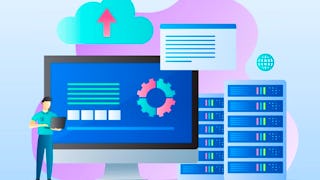This course provides essential skills for modernizing data architectures by adopting a data-as-a-product approach. It emphasizes building modular, scalable systems to enhance data management and unlock greater value from data assets.



Managing Data as a Product: Scalable Data Architectures

Instructor: Packt - Course Instructors
Access provided by Refugee Talent Hub
Recommended experience
What you'll learn
Overcome challenges in scaling monolithic data platforms
Adopt a data-as-a-product approach for sustainable growth
Navigate the full lifecycle of data products from inception to decommissioning
Skills you'll gain
Details to know

Add to your LinkedIn profile
12 assignments
October 2025
See how employees at top companies are mastering in-demand skills

There are 12 modules in this course
In this section, we examine monolithic data platforms' limitations and explore modular approaches to reduce accidental complexity and improve system sustainability through data product strategies.
What's included
2 videos8 readings1 assignment
In this section, we define data products and pure data products, analyze their structure and characteristics, and explore methods for classifying them to enhance data utilization.
What's included
1 video8 readings1 assignment
In this section, we examine data-product-centered architecture design, operational and management planes, and alternative data management approaches for scalable, adaptable solutions.
What's included
1 video4 readings1 assignment
In this section, we explore domain-driven design and event storming to identify data products, and manage their portfolio for business alignment and operational coherence.
What's included
1 video8 readings1 assignment
In this section, we examine data product design, interactions, and implementation, focusing on metadata management, machine-readable descriptors, and data flow processes for scalable solutions.
What's included
1 video8 readings1 assignment
In this section, we explore deploying data products using CI/CD, governing them with policies, and managing their evolution to ensure reliability and alignment with organizational standards.
What's included
1 video9 readings1 assignment
This section covers automating data product lifecycle management with XOps, focusing on platform capabilities and implementation strategies.
What's included
1 video6 readings1 assignment
In this section, we explore the adoption phases of data as a product, focusing on challenges, strategies, and adaptive data governance to ensure sustainable and scalable implementation.
What's included
1 video8 readings1 assignment
In this section, we explore team topologies and data ownership strategies to optimize organizational structures for scalable data product delivery and efficient team collaboration.
What's included
1 video9 readings1 assignment
In this section, we explore distributed data modeling techniques, focusing on physical and conceptual approaches to design explicit models for data products in decentralized systems.
What's included
1 video11 readings1 assignment
In this section, we explore building an AI-ready information architecture by designing a knowledge plane for semantic interoperability and constructing an enterprise knowledge graph for AI integration.
What's included
1 video7 readings1 assignment
This section covers core beliefs and organizational changes for effective data management.
What's included
1 video4 readings1 assignment
Instructor

Offered by
Why people choose Coursera for their career




Explore more from Data Science

Johns Hopkins University

Duke University



